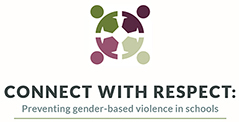New teaching tool to help prevent violence in schools launched in Viet Nam
Date:
![[partners]](/sites/default/files/Field%20Office%20ESEAsia/Images/2016/11/Connect-with-respect-partner-675px.jpg?la=en)
Author: Dang Huong Lan
Hanoi, Viet Nam – Viet Nam’s secondary schools now have an innovative teaching tool aimed at stemming gender-based violence against students, an increasingly serious problem that UN Women is helping to solve in the country.
![[IMAGE]](/sites/default/files/Field%20Office%20ESEAsia/Images/2016/11/IMG_4508-675px.jpg?la=en)
The web-based toolkit, “Connect with Respect: Preventing Gender-based Violence in Schools,” was launched at a workshop in Hanoi today. More than 50 teachers and education managers and experts in Viet Nam learned how to use the toolkit in the one-day training led by the Viet Nam Ministry of Education and Training and supported by United Nations agencies including UN Women.
The toolkit provides learning activities such as role plays and group tasks that promote respectful relationships and gender equality among students from 11-14 years old. It can be adapted for use by older students, and can be used in non-formal education settings, including community learning and literacy programs.
The Hanoi workshop was the first launch of the toolkit designed for use in schools in the Asia-Pacific. It was developed based on scientific research and experience from countries in the region. The University of Melbourne in Australia created the toolkit with the support of the Regional Working Group on School-related Gender-based Violence under the United Nations Girls’ Education Initiative and the United Nations’ UNiTE to End Violence against Women project. The working group comprises Plan International, UN Women, UNESCO and UNICEF.
The Viet Nam Ministry of Education and Training said the launch was timely, coming after the recent approval of the country’s Child Law and the on-going drafting of the Decree on Safe, Friendly and Non-violent Education Settings as detailed guidance to implement the Child Law.
![[IMAGE]](/sites/default/files/Field%20Office%20ESEAsia/Images/2016/11/IMG_4332-675px.jpg?la=en)
Shoko Ishikawa, Country Representative of UN Women Viet Nam, said: “We need to be strongly aware of the gender dimension of violence, bullying and harassment in and around schools which is rooted in gender stereotypes and unequal power relations based on gender. The neglect of this fact will affect the impact of any effort which aims to address violence in school settings and undermine the achievement of quality, inclusive and equitable education for all children. At the same time, if we do not address these attitudes and behaviours among young people early, gender-bias and gender-based discrimination will continue as norm in this generation that will be our future leaders.”
In a 2015 survey UNESCO did in schools in six provinces in northern, central and southern Viet Nam, more than half of the students surveyed said they had experienced at least one kind of violent abuse in the previous six months; lower secondary students were particularly targeted. And a survey done in 2012 by the Centre for Creative Initiatives in Health and Population among 520 LGBT people (average age 21) in Viet Nam found that nearly 41 per cent had suffered from discrimination and violence at school or university.
![[IMAGE]](/sites/default/files/Field%20Office%20ESEAsia/Images/2016/11/IMG_0189-400px.jpg?la=en)
Such abuse causes low self-esteem, depression, increased absenteeism, poor performance, school dropouts, pregnancy and sexually transmitted infections such as HIV. Also substantial is the economic cost to school systems in developing countries like Viet Nam.
Despite this, United Nations research has shown that the problem still receives limited attention. The research suggests that girls are at greater risk of sexual violence, harassment and exploitation, while boys are more likely to experience frequent and severe physical violence. Boys are more commonly use physical bullying, while girls are more likely to use verbal or psychological forms of abuse.
The toolkit can be accessed here:
For further information:
Please contact Hoang Bich Thao
Communications Officer, UN Women Viet Nam
Mobile: 012 0514 3996
Email: [ Click to reveal ]
![[IMAGE]](/sites/default/files/Field%20Office%20ESEAsia/Images/2016/11/Connect-with-respect-400px.jpg?la=en)